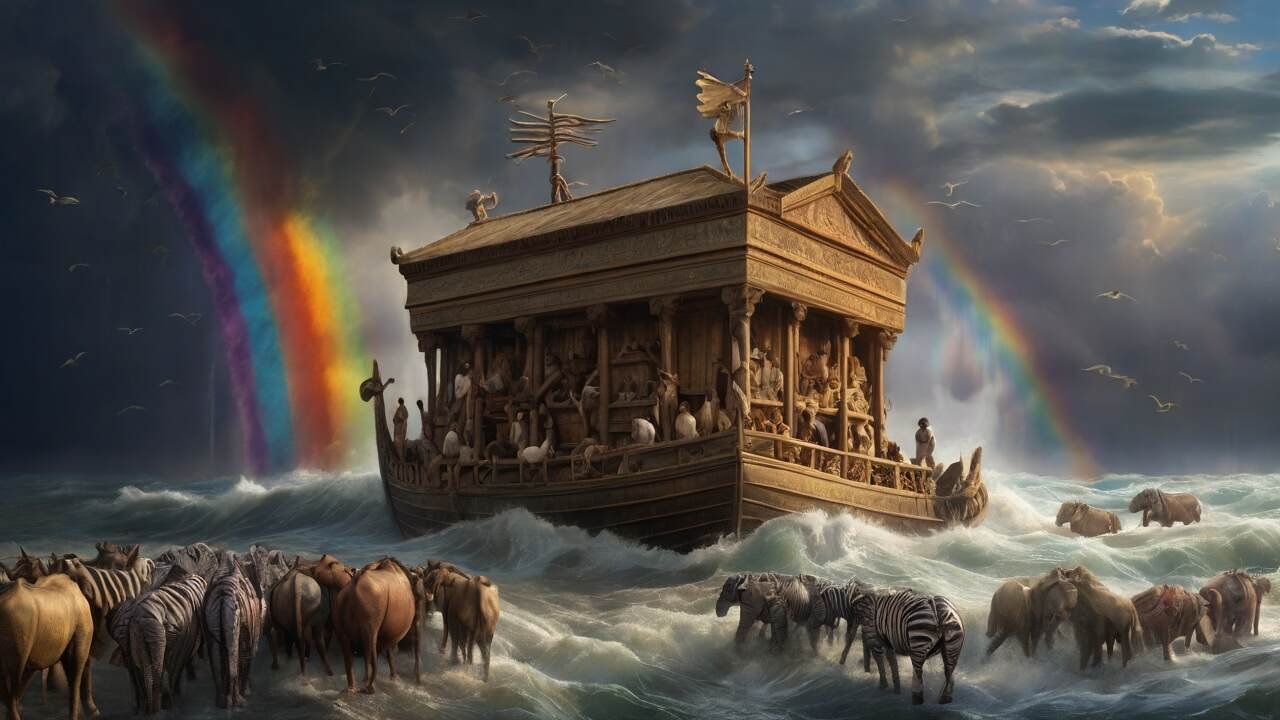The Genesis creation story in the book of Genesis is a topic of great interest and debate among Christians. There are diverse perspectives on how to interpret this foundational biblical narrative and its significance for the Christian faith. The three main views are Young Earth Creationism (YEC), Old Earth Creationism (OEC), and allegorical/evolutionary creationism approaches. While the interpretation of the creation days is a subject of ongoing discussion, Christians generally agree that belief in God as the Creator is a central tenet of the faith.
Key Takeaways
- Christians hold various views on the interpretation of the Genesis creation story, including Young Earth Creationism, Old Earth Creationism, and allegorical/evolutionary approaches.
- The debate centers around the literal versus figurative interpretation of the creation timeline and the relationship between biblical accounts and scientific evidence.
- Belief in God as the Creator is a fundamental doctrine shared by most Christians, regardless of their specific views on the details of the creation narrative.
- The Genesis creation story is a source of ongoing discussion and study, with Christians seeking to reconcile their faith with their understanding of the natural world.
- Interpretations of the creation story can have implications for Christian beliefs on the origins of life, the nature of God, and the authority of Scripture.
Introduction to the Genesis Creation Story
The biblical book of Genesis is a foundational text for Christians, as it provides insights into the origins of the universe, life, and humanity. The creation narrative found in the first chapters of Genesis is a crucial part of the Christian faith, shaping beliefs about the divine origin of the world and the relationship between the Creator and His creation.
Importance of the Creation Narrative
For Christians, the creation story in Genesis carries immense significance. It establishes the concept of God as the sole, all-powerful Creator of the universe, reinforcing the belief that all of existence is the product of divine design and purpose. This narrative also introduces the idea of humans being created in the image of God, endowing them with a unique spiritual and moral nature.
Overview of Christian Perspectives
While Christians universally accept the creation story as a divinely inspired account, there is a range of perspectives on how to interpret this foundational text. Some Christians adhere to a literal interpretation of the Genesis creation narrative, viewing it as a precise, historical record of the origins of the world. Others adopt a more figurative or allegorical approach, seeing the creation story as a symbolic representation of theological truths rather than a literal, scientific explanation.
Exploring the diverse Christian perspectives on the creation story in Genesis is essential for understanding the complex relationship between Christian theology and scientific theories of the origins of life and the universe. This examination sheds light on the ongoing dialogue between faith and reason, as believers seek to reconcile their religious beliefs with the findings of modern science.
Young Earth Creationism (YEC)
Some Christians adhere to a belief system known as Young Earth Creationism (YEC), which interprets the creation narrative in the book of Genesis as a literal, historical account. YECs believe that the earth and the universe were created in six 24-hour days, as described in the biblical Genesis account, resulting in a 6,000-year-old universe. This recent creation view contrasts with mainstream scientific theories that suggest a significantly older earth and universe.
Literal Interpretation of Genesis
YECs take a literal approach to the biblical interpretation of the creation story. They view the Genesis narrative as a factual, chronological record of the universe’s origins, rather than a figurative or allegorical account. This adherence to a literal reading of the text leads YECs to reject the scientific consensus on the age of the earth and the evolutionary origin of life.
6,000-Year-Old Universe and Recent Creation
Based on their interpretation of the biblical genealogies and chronologies, YECs believe the earth and the entire universe were created approximately 6,000 years ago. This “recent creation” view stands in stark contrast to the scientific evidence that suggests the earth is around 4.5 billion years old, and the universe is approximately 13.8 billion years old. To reconcile this, YECs have developed a field of study known as creation science, which seeks to provide scientific explanations that support their biblical interpretation of the Genesis account.
While YECs believe their interpretation of the creation story in the book of Genesis is the most faithful to the biblical text, their views continue to be a subject of ongoing debate and controversy within the broader Christian community and the scientific community.
Old Earth Creationism (OEC)
While some Christians hold a Young Earth Creationist (YEC) view, others interpret the creation story in the book of Genesis through an Old Earth Creationist (OEC) lens. OECs generally accept the scientific evidence for an old earth, approximately 4.5 billion years, and an ancient universe, around 13.8 billion years old, while still affirming their belief in God as the Creator.
Figurative Interpretation of “Days”
OECs often see the Genesis account as a figurative or analogical representation, where the “days” of creation are understood as longer periods of time rather than literal 24-hour days. This figurative interpretation allows OECs to reconcile the scientific evidence for an old earth with their biblical interpretation of the creation narrative.
Acceptance of Scientific Evidence
Unlike YECs, who tend to reject or dismiss scientific data that contradicts a young earth, OECs are more willing to incorporate scientific evidence into their understanding of the Genesis creation story. They view the creationism portrayed in Genesis as a theistic account, where God is the ultimate Creator, but the specific details and timelines may be interpreted in a more flexible manner.
By adopting an Old Earth Creationist perspective, these Christians seek to harmonize their faith with the overwhelming scientific consensus regarding the age of the earth and the universe, while still maintaining a belief in God as the designer and sustainer of all creation.
How do Christians interpret the creation story in the book of Genesis?
While young-earth creationism (YEC) and old-earth creationism (OEC) represent two of the most prominent Christian perspectives on the Genesis creation narrative, some believers adopt alternative interpretations. These approaches do not view the account as a literal, historical record, but rather as a symbolic or metaphorical representation of theological truths.
Allegorical Interpretations
Allegorical interpretations of the Genesis creation story see the “days” of creation not as literal 24-hour periods, but as literary devices used to convey deeper spiritual meaning. Proponents of this view argue that the text is not intended to be read as a scientific or chronological account, but rather as a theological statement about God’s role as the ultimate Creator.
Evolutionary Creationism
Another perspective, known as evolutionary creationism, holds that God used the process of evolution as the means by which He created the diversity of life on Earth. Evolutionary creationists believe that the Genesis account is not meant to be a literal, step-by-step description of how creation unfolded, but rather a poetic and symbolic representation of God’s work as the Creator.
“The Genesis creation narrative is not a scientific textbook, but a profound theological statement about the nature of God and His relationship with His creation.”
Proponents of allegorical and evolutionary creationism argue that these interpretations allow for the reconciliation of the biblical account with scientific evidence, while still maintaining a fundamental belief in God as the ultimate source of creation.
Overall, the diversity of Christian perspectives on the Genesis creation story reflects the complexity and nuance of biblical interpretation. Whether one adopts a literal, figurative, or evolutionary view, the common thread is a belief in God as the divine Creator who has revealed Himself through both Scripture and the natural world.
Micro vs. Macro Evolution
The ongoing debate between Christians and mainstream science regarding the origins of life often centers around the concepts of microevolution and macroevolution. While Christians generally accept the principles of microevolution, which refers to small-scale changes within a species over relatively short periods of time, disagreement arises when discussing macroevolution – the large-scale changes that lead to the formation of new species and higher taxonomic groups over geological time.
Many Christians, including some creationists, are willing to acknowledge the evidence for microevolution, such as the observed changes in the coloration of peppered moths or the development of antibiotic-resistant bacteria. However, they often reject the theory of macroevolution, which proposes that all life on Earth has descended from a common ancestor through a gradual process of evolution.
The Genesis account of creation, which is central to the biblical interpretation of many Christians, describes the creation of various “kinds” of organisms. Creationists argue that these “kinds” represent the basic units of life, and that while minor variations can occur within a kind, the fundamental distinctions between different organisms cannot be bridged through evolutionary processes.
Proponents of creationism often point to the lack of clear transitional fossils and the perceived gaps in the fossil record as evidence against macroevolution. They contend that the sudden appearance of complex life forms in the geological record, known as the “Cambrian explosion,” is more consistent with the biblical account of creation than with a gradual, evolutionary process.
Ultimately, the debate between microevolution and macroevolution remains a significant point of contention between Christians and mainstream science, with both sides presenting arguments based on their respective interpretations of the biblical interpretation and the available scientific evidence.
Essential Christian Doctrines
When it comes to the Christian interpretation of the creation story in the book of Genesis, belief in God as the Creator is considered a central and essential doctrine. However, the specific details of how and when God created the universe are often viewed as tertiary or secondary issues, not directly affecting the core tenets of Christian faith.
Primary vs. Tertiary Doctrines
Creeds and doctrinal statements of evangelical Christian churches generally focus on primary doctrines such as the Trinity, the Virgin birth, the atonement, and salvation by grace through faith, rather than taking a firm stance on the timing or process of creation. While the biblical interpretation and creationism debates surrounding the Genesis account continue, these discussions are typically considered tertiary doctrines that do not directly impact the essential Christian doctrines.
This distinction between primary and tertiary doctrines allows for a diversity of views within the Christian community when it comes to the How do Christians interpret the creation story in the book of Genesis? While some Christians adhere to a young earth creationism (YEC) perspective, others embrace an old earth creationism (OEC) or even an evolutionary creationism viewpoint. These differences in biblical interpretation are often seen as secondary to the foundational beliefs that define the Christian faith.
| Primary Doctrines | Tertiary Doctrines |
|---|---|
| Trinity | Genesis Creation Timeline |
| Virgin Birth | Literal vs. Figurative Interpretation |
| Atonement | Young Earth Creationism |
| Salvation by Grace | Old Earth Creationism |
By maintaining a focus on the primary doctrines, Christian churches are able to unity and fellowship, even in the face of differing views on the creationism debate surrounding the Genesis account. This allows for a diversity of perspectives while upholding the core beliefs that define the Christian faith.

“The primary doctrines are the essential beliefs that define the Christian faith, while the tertiary doctrines are secondary issues that allow for a diversity of perspectives.”
Conclusion
The Genesis creation story has been a source of fascination and debate within the Christian community for centuries. While there are diverse perspectives on how to interpret this foundational biblical narrative, Christians generally agree that belief in God as the Creator is a central tenet of their faith. The specific details of the creation timeline and process, however, are often viewed as tertiary issues that do not directly affect the core doctrines of Christianity.
As believers continue to grapple with the relationship between faith and science, maintaining unity and focus on the primary teachings of the Christian faith remains essential. Regardless of one’s stance on the intricacies of the creation account, the overarching message of God’s sovereign power and the inherent value of human life is a unifying theme that transcends the specific debates surrounding the Genesis creation story.
Moving forward, it is crucial for Christians to approach this topic with humility, openness to diverse perspectives, and a steadfast commitment to the fundamental tenets of their faith. By doing so, the church can continue to be a beacon of hope and guidance in a world that often seeks answers to life’s deepest questions.
FAQ
What is the significance of the Genesis creation story for Christians?
The Genesis creation story is a foundational text for the Christian faith, providing insights into the origins of the universe, life, and humanity. Christians view this narrative as divinely inspired and seek to understand its significance for their beliefs.
What are the main interpretations of the Genesis creation story among Christians?
There is a range of perspectives among Christians regarding the interpretation of the creation account, with some taking a literal approach (Young Earth Creationism) and others adopting more figurative or allegorical interpretations (Old Earth Creationism, Evolutionary Creationism).
What is Young Earth Creationism (YEC)?
Young Earth Creationism (YEC) interprets the creation narrative in Genesis as a literal, historical account, believing that the earth and the universe were created in six 24-hour days, resulting in a universe that is approximately 6,000 years old.
What is Old Earth Creationism (OEC)?
Old Earth Creationism (OEC) interprets the “days” of creation in Genesis as longer periods of time rather than literal 24-hour days, generally accepting the scientific evidence for an old earth (approximately 4.5 billion years) and the universe (around 13.8 billion years).
What are the allegorical and evolutionary creationist views on the Genesis creation story?
Allegorical interpretations view the “days” of creation as literary devices rather than temporal periods, while evolutionary creationists believe that God used the process of evolution as the means by which He created the diversity of life on Earth.
What is the difference between microevolution and macroevolution, and how do Christians view them?
Microevolution, referring to small-scale changes within a species, is generally accepted by both creationists and evolutionists. However, disagreement arises when discussing macroevolution, the large-scale changes that lead to the formation of new species and higher taxonomic groups over geological time, which many creationists reject.
How do essential Christian doctrines relate to the interpretation of the Genesis creation story?
While the interpretation of the Genesis creation story is a topic of ongoing discussion and debate, belief in God as the Creator is considered a central and essential doctrine. However, the specific details of how and when God created the universe are often viewed as tertiary or secondary issues, not directly affecting the core tenets of Christian faith.









Leave a Reply